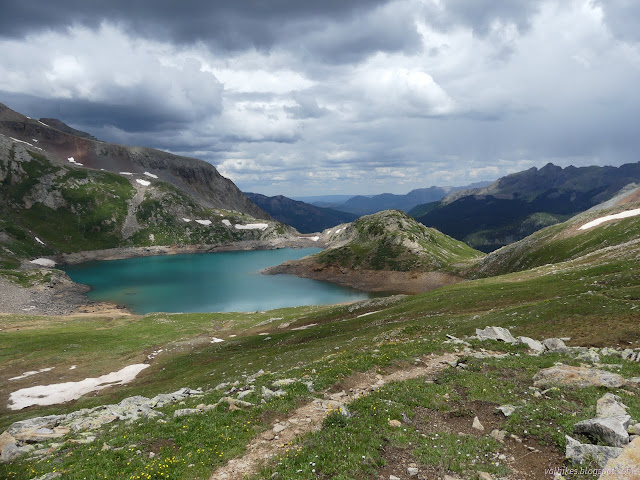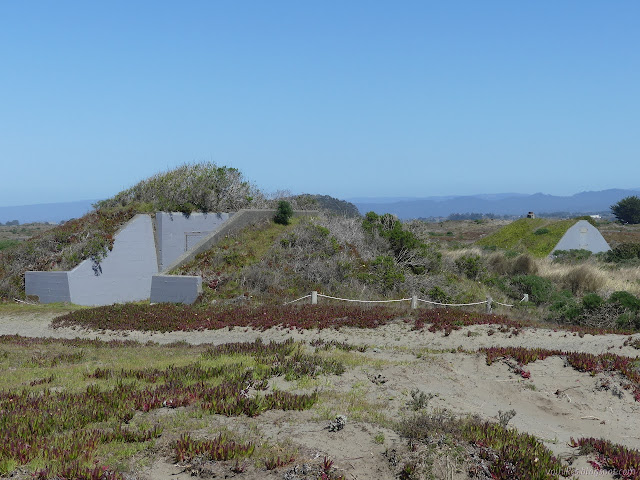Superstition Mountains: Miners Needle and Red Tanks
Tonto National Forest
DAY 1 | DAY 2 | DAY 3 | DAY 4 | DAY 5
I had wanted to get about an hour of hiking at the end of the drive yesterday, but it was dark already by the time we pulled into the trailhead. In planning when to leave, I remembered the time change, but all the other little things over the eight hour trip drew it out longer. We could have hiked out in the dark, but that would mean missing this new scenery. Besides, we seemed to have already flipped whatever internal switches there might be to change over from paying attention to the clock to paying attention to the sun. The sun was down and we were tired. We found a place to camp instead of hiking. We will just have to do a little extra hiking when we are fresh on the first day.

So the break of day finds us at what may be the most popular trailhead outside of Phoenix. Why here? I made a quick search for popular loop hikes and found something that looked good. I could find a couple maps of the Superstition Wilderness, so it must be popular. Life is too short to agonize over what would make the best hike. If we found it, where would we go for our second hike? We bought the map from Beartooth Publishing since it actually marks mileages on the trails and the smaller publisher should be more attuned to those places it maps. (I will have some gripes about this map by the end of the trip, though.) I picked out a couple loops: one on the east side including about 20 miles of the Arizona Trail, and one on the west side wandering high and low over what looks like pretty gentle country. We ultimately chose the lower west side where the plants would be more exotic (and pointy) to us over the higher east with the romanticism of getting in a piece of a long trail.
One thing I noticed while looking over the map is that there are no twisty blue lines. Every single creek in the area is intermittent. The route was not solidified until I could find good information on water sources. For our local forest, we have HikeLosPadres to research water conditions. The Arizona Trail has a group devoted to it that reports on water, but they say nothing about away from the trail. A little more digging and I found that HikeArizona has water reports. This told me that I was passing four well spaced, reliable springs and would have probable water in other places, too. It does not hurt that there have been a couple nice rains in the last couple weeks, either.

Unfortunately for our start time, it is a bit of a battle to actually sort all of Martha's gear into her new 50L pack. Something about a giant down bag and no compression sack and the one compression sack we had been able to find on the way in being a ridiculous design and a bit too large anyway. By the time we are ready to hike, the parking lot is nearly full of cars. On a Monday. This really is a popular trailhead. There are three trails that leave from it. The sign boards by it contain water reports for major springs in the area, a map, and elevation profiles of all the trails. This last is a nice surprise. We head out on Dutchmans Trail, which seems to be the least popular of the three.


Our route is not quite left to just us. We can see a group of horses and short mules for the kids is starting off and they turn our way. There is also some very recent looking trail work, and before long we have found a small piece of the American Conservation Experience group we saw heading out earlier. After the one passes and we pass the other, we are alone again, just pondering the little pieces of evidence that there has been water here even if there is not now.




And so it goes as we wander our new, spiked environment. It is an easy, rolling place as expected.



The first junction shows our trail is not so unpopular, too. As we grab a new trail to continue east, there is a distant group coming down it on a loop. As we climb out of Barkley Basin, our trail joins what appears to be an old road. We are passed by a day hiking couple, but only briefly. They stay a while at the top of the hill, then turn back saying now solitude will be ours. We are not all that far from the trailhead, so I figure this is probably not quite true. It is a nice view at the top, and I can see why there might be some water in the upcoming canyon.


There is a gate as we make our way down Coffee Flat to a couple windmills noted on the map. There is no obvious evidence of cows past the gate, but we do catch some musk hogs gobbling up some prickly pears. There are a couple families with little ones that scramble and run away as we approach.

The musk hogs are near a windmill, but there is no available water evident near it. Nearby cottonwood trees are turning yellow with the season. They grow in a very limited area. Poking around the windmill, there were actually two once, but one has collapsed into metal debris. Someone has left oil for the other, but was not brave enough to climb up it and use it. Past another gate is another windmill that looks like it would need more than oil to work.

The gate marks the edge of the wilderness and there is plenty of evidence of cows beyond it. A big branch lies across what may be trail heading south to help us make the turn into the canyon, but then things get difficult to follow. Cow paths mix with trail and it looks like trail is really just the tallest cow path winding along the bottom of the canyon. While it is dark and cool in the canyon, there is no water in this part besides whatever the windmills provide access to.

We get to know the footprints of those who came before us rather well as we go. They are nice assurances that we are on the correct route, but there are very few of them. Perhaps that couple was correct that we will now have the place to ourselves.

There is one last gate and we reenter the wilderness, but the evidence of cow is just as strong as before. Pools do pop up as we get close to Dripping Spring, one of the springs I identified as reliable. The first is accompanied by a dreaded invader tamarisk. The pools look nice enough and although the spring sounds interesting to see, being in a cave, it is not clear how to get to it. There is much less effort to just grab water from the creek bed.


We come to a big canyon coming in from the north. There are still a few pools of water among its rocks. We still are very unsure of the trail, so finding a junction seems particularly iffy. Deciding to explore around two rather insistent looking cairns on the far side of the canyon, I find a sign I am hoping to see. This is Red Tanks and the trail is clear, at least at the southern terminus.

The footprints we have become familiar with along the previous trail make the same turn and continue to assure us of our path. From here, the trail climbs up on the side of the canyon and drops down again. Then far up and down and up some more. Down below as we wander high, there is a single cow. Well, probably a steer. It could not have made all of that mess back there on its own. It has to have friends somewhere.



It is getting late and we have not made up our lost miles from yesterday. We are not getting anywhere that looks like a camping spot as we near the top of Red Tanks Divide. The good news is, there are a couple pools around to get enough water for camping.



There is a surprise for me. I had input the estimated locations for a couple section corners that the trail passes by according to the 2004 Weavers Needle quad. Through here, the trail passes on the opposite side of a large hill from what is indicated on that map (but is accurate on the 1966 quad and the Beartooth Publishing map) and nearly runs into one I had not marked. It is a nice, tall post with a cap dated 1919. My first Gila and Salt River referenced section corner and I did not even have to work at it.

As the light fails us, we pass by a particularly large pool under a rock. We grab just a little more water from it to allow for camping as we near the top of the divide. Just past another rock, there is a flat spot large enough for two people. Unfortunately, like every flat spot around here, it contains a fire ring at the side that eats into one spot. I do not even know what people might be burning up here. That has to go, but this will work. We have a place to sleep for the night.
Continue reading: day 2
©2016 Valerie Norton
Posted 13 December 2016
Liked this? Interesting? Click the three bars at the top left for the menu to read more or subscribe!




Comments